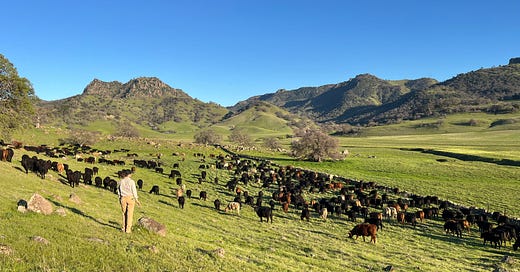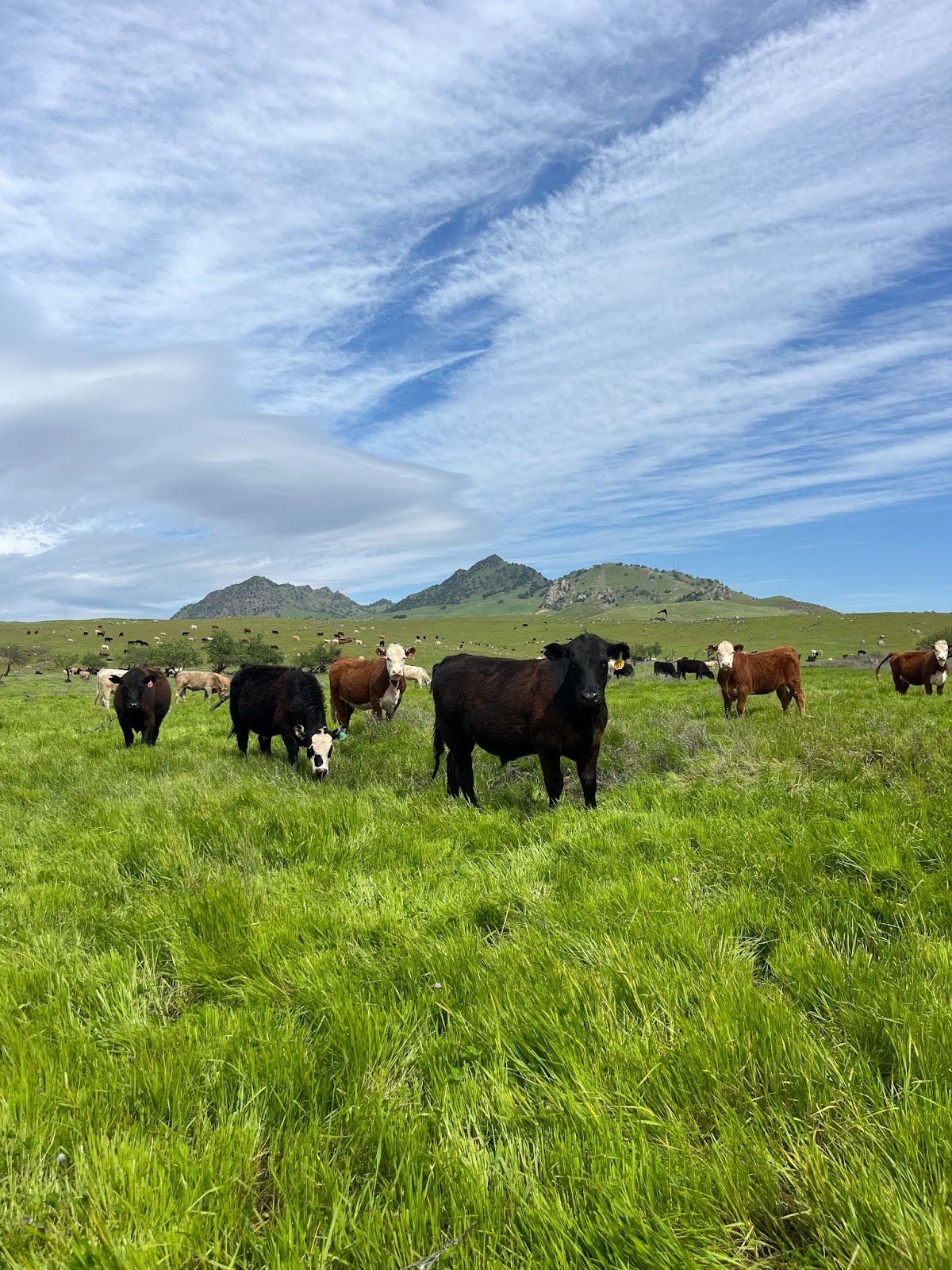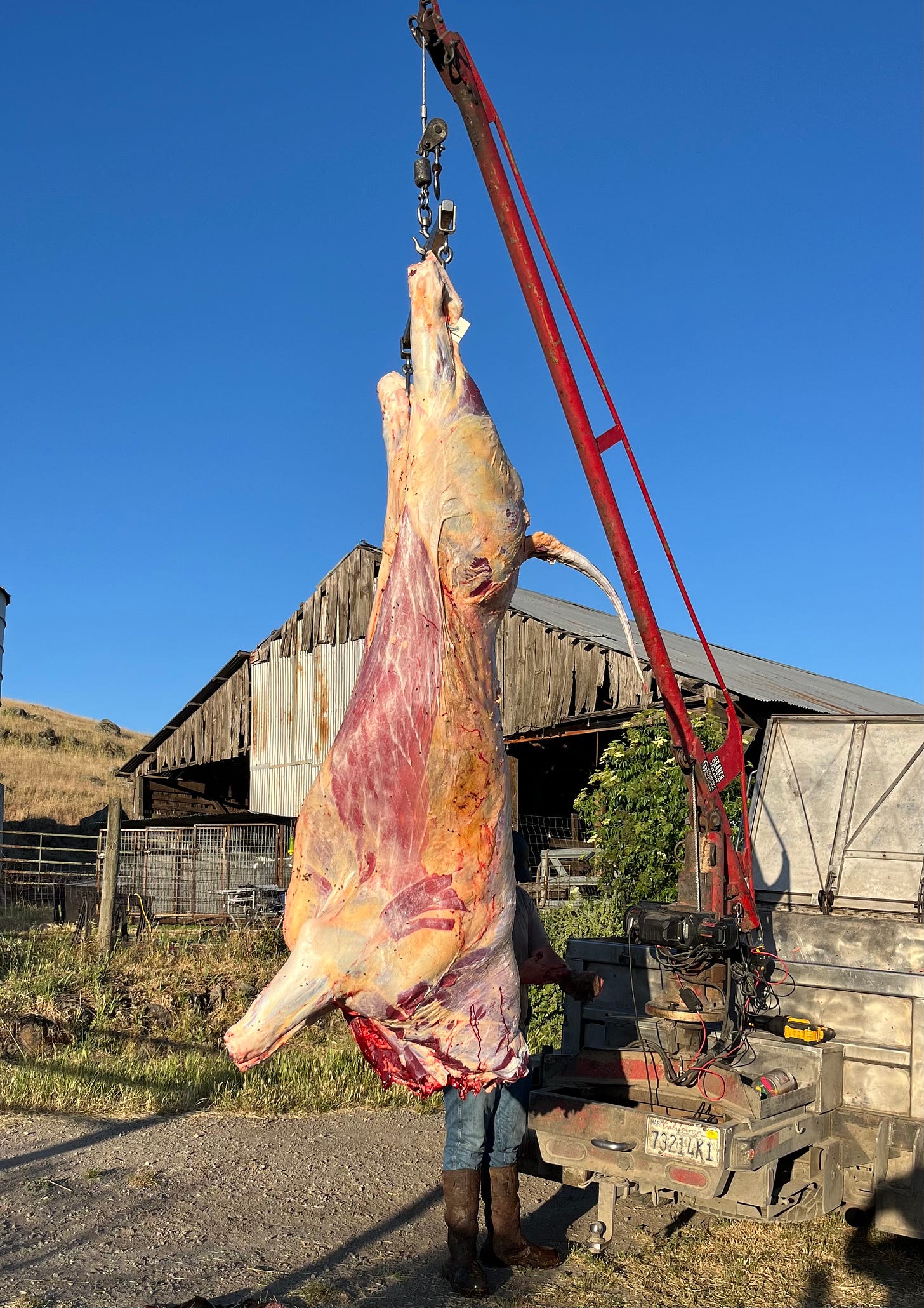I haven’t been writing much over the last three years, largely because since my wife Riley and I started our own custom grazing business in 2022, I’ve mostly been running to stay upright. But as our third grazing season draws to a close, I wanted to reflect on some of the philosophical questions that underpin the work I love. Let’s start with some back of the napkin math that I found pretty staggering. We are paid to put weight on yearling cattle while they are under our care, and to feed cows as they grow, birth, and nurse calves. If we simply look at the difference in weight between the 600 plus yearling cattle that arrive on our ranch in January and the weight of the cattle that leave in June, we shipped out roughly 140,000 more pounds of beef than we received (and that doesn’t even consider the ~150 calves born annually on the other half of the ranch). Another way to put that is that through the alchemy of rumination, over five months they turned the grass from 2700 acres of nutrient poor cellulose, into 140,000 lbs of nutrient rich meat. Conservatively, by the time everything’s been slaughtered, butchered and packaged (i.e. by the time the hide, hooves, head, bones, and some organs and bones have been removed) 36% of that weight will end up on someone's plate. This means we produced just over 50,000 pounds of beef. The average American eats 59 lbs of beef per year, which means we supplied enough beef to feed approximately 850 people for a year.
I feel good about this. Not only are we contributing to feeding people, but to feeding them some of the highest quality, most nutrient dense, phytochemically rich, nourishing meat I know of. Increasingly studies demonstrate that grass-fed beef is higher than feedlot beef in beta-carotene, vitamin E, essential omega 3 fatty acids, Conjugated Linoleic Acid (CLA), and Trans Vaccenic Acid (TVA) and many other essential nutrients. And if you have no idea what any of those words mean you’re not alone. Perhaps a simpler way to think about it is that when cattle have a diverse diet consisting of the wide array of healthy grasses forbs and shrubs which compose the complex ecology of our ranch, without the deleterious impact of sub-therepudic antibiotics, growth hormones, and herbicides, they are healthy and their meat is healthy. If they are fed in a dirt feedlot with a diet consisting largely of grains they did not evolve to consume and then given an array of chemicals to keep them from keeling over, both them and their meat are unhealthy. Pretty simple. Our ranch produces food that is better for us than the food produced by industrial agriculture.
Similarly, the impact on the land itself is in my view, unequivocally positive. I have written extensively on this in previous blogs, and will again. But suffice to say, when we manage our cattle to mimic the grazing patterns of native ruminants, defoliating our grasses to stimulate new growth and providing them sufficient recovery afterwards, we get a complex web of biodiverse, carbon rich, abundant grasslands. This is something you can sense when you walk through our pastures. It is also something that we have good evidence to support. We have a number of monitoring points throughout our ranch to examine and confirm improvement over time in terms of biomass, diversity, soil carbon and structure, water infiltration, etc. Our ranch is a better home for thousands of plants, animals and insects, because the cattle are managed as they are.
The questions of the health of the land and the health benefits of the meat that come from it are complex, but ultimately quantifiable and verifiable scientifically. I feel on solid ground in defending them. But there is a third question that inevitably arises among those skeptical about the idea that eating meat can be a morally righteous act. And it dwells squarely in the realm of the philosophical. I was raised vegetarian and my parents still are. Though questions of the environment and health were part of our rationale, they were not the central reason we didn’t eat meat. It came from a cardinal sense of the inherent wrongness of taking a life. As a kid growing up in Berkeley, a bastion of liberal urban America, I had no relationship to death, and it seemed so viscerally wrong for my diet to be dependent on it.
But the thing I did not, perhaps could not, understand completely when I had no direct relationship to the land that fed me, is that life requires death. It's the other side of the coin. The idea that death is bad is rooted in a fear of death and decay and a lack of understanding that life is predicated upon it; that they are not two distinct things but just two aspects of the same cycle. Another way to say that would be that we are hyper focused on the individual components of the world, the temporary manifestations of energy that forms a tree or a cow or a person. That's understandable, because we are temporally bound in these discrete little packages of flesh and ego. But in order for things to grow, things have to die. Death and decay feed new life which temporarily grows and blossoms and then wilts and decays in an endless circle that we are all a part of. We have a much easier time accepting that with plants but because we are more evolutionarily similar to animals, it is harder to accept in relation to them. They remind us of our fragile mortality. It's not wrong to take the life of another creature to nourish your own. Every other living thing on the planet does this. It is wrong to do it without reverence and gratitude and without assuming a deep responsibility to ensure that the life of whatever creature you're eating has been a good one. Rural folks who depend on and are connected to land tend to understand this. But many urbanites are so shielded from everything that makes their lives possible that they labor under the illusion they can get through this life without taking from or giving back to the earth and without assuming the responsibility inherent in that relationship.
When we refuse to accept this responsibility seeking the absolution of veganism we are fooling ourselves.* In order to grow almost all crops we have to eliminate the vast majority of life in the area we are farming. To grow a field of wheat, or corn, or carrots, we till up the soil, we destroy the native ecology, and we extirpate the coyotes, rodents, and birds that call it home. When we plow up grasslands (which is what most cultivated farmland was at one point in time), we fundamentally transform a piece of land. We simplify and impoverish the ecosystem that was once there and bending it to our will, usually to grow a single monocrop, often across hundreds or thousands of lifeless acres. The amount of life taken in order to produce food this way is almost incalculable. Raising grass-fed cattle, or sheep, or other ruminants on the other hand, leaves the ecosystem that already existed there in place. There is no need to till the soil, move the rocks, cut the trees. Even when done poorly, it is vastly better ecologically than most "plant based" agriculture. And when done well not only does it leave the ecosystem that existed, it enhances and supports it, providing the context for hundreds of creatures to thrive and make a home. Grasslands must be maintained by grazing animals. If maintained by wild grazers (elk, bison, etc), instead of cattle, those animals would also be killed and eaten, only in a far more painful way; in the jaws of predators. Death is always part of the deal. So we hold up our end of that deal and promise to give our cattle a good life and a quick death; it’s all any of us can hope for.
If you want to support our work, and be a part of maintaining these vital grasslands and savannas, we offer a small number of seasonal shares of grass-fed grass-finished regeneratively grazed beef. Find details on our website, and shoot us an email to reserve your beef share.
*I should note that this is in no way meant to be a criticism of people who choose not to eat meat. Indeed in many ways, when given the choice between industrially raised pork, chicken, or seafood and a “plant based” option, the latter is superior in its environmental and moral impact. I appreciate anyone who is introducing some degree of intentionality and applying an ethical lens to their consumption. If you are doing so, I salute you, and honor wherever you land on the topic. I simply hope to provide a more expansive context to a conversation that so often lacks nuance.






This weekend I met up with a friend who does not eat beef any longer because cows are cute and eating them seems cruel. I tried to explain the nuance of why I eat beef that is grown by ranchers, is nutrient dense, not grain fed, raised in a way that supports the land and heals the environment. (I follow and support a few of you who choose to raise beef or buffalo or venison this way). She couldn’t stop her vegan propaganda long enough to listen to me. Does she think cows never die if they aren’t harvested for food? Does she think we have unlimited resources to keep cows in sanctuaries as pets? I wish I’d read this article before we’d met up. You very succinctly say what I was trying to convey to her.
Thank you for the poignant words and points. I raised rabbits for a few years to face some of my unexplored truths as an omnivore. It wasn't "fun" to process, but I found myself deeply rewarded for doing the work of dispatch and processing. Now I teach foraging, angling, hunting, processing and cooking. I see the eyes and hearts of my students opening as they "peel back the onion" of their socialization. Death is necessary for life. And having a personal relationship with your food is a powerful part of personal and community development.